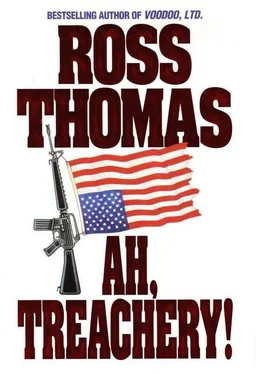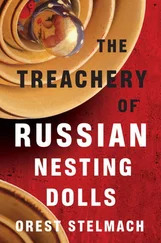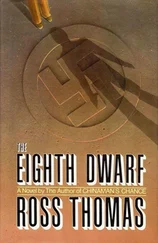The General sat as he almost always sat, not quite at attention, knees nearly together, hands on thighs, topcoat folded over knees, hat on topcoat, back straight but not touching anything. Winfield had restless shiny blue eyes that were fine for distance but needed glasses for reading. They flicked around the big room, noting all changes — even a nearby recent copy of El Pais , airmailed from Madrid. He assumed Patrokis must have recently subscribed to it.
The General’s gaze eventually landed on the back of Emory Kite’s head. He noticed the private investigator wore earphones as he typed away at his computer. Winfield didn’t care for Kite and had opposed renting him space. But the $1,100 monthly rent Kite had agreed to pay for a fourth-floor walkup office was such a godsend to the organization that the General had withdrawn his objection.
When Kite stopped typing to stretch, both hands high above his head, Winfield shifted his gaze back to the upside-down flag. Kite swiveled 180 degrees, noticed the General’s fixed stare and used the opportunity to inspect him for signs of dissipation or dotage. He found only planes and angles that formed a resolute chin, an extra-bold nose, a rather stern mouth, a smart high forehead, a sagless throat and a lot of thick white hair, neither short nor long, that lay flat on the narrow head and looked as if it had been parted on the left at birth.
Kite was wondering how many men still wore real hats when Patrokis finally ended his phone call, turned to the General and asked, “You got any idea where we could lay our hands on five thousand dollars cash money?”
As Patrokis’s raspy baritone came through Kite’s earphones, he quickly turned back to his personal computer, switched on a concealed mini-recorder and slowly began typing “Now is the time for all good men to come to the aid of their party” over and over as he both recorded and listened to the conversation between the two founders of Victims of Military Intelligence Treachery.
It was a moment or two before General Winfield replied to Patrokis’s question with a sigh and a question of his own. “Five thousand for what?”
“There’s this Salvadoran ex-Army Captain, an illegal, holed up on Columbia Road who claims he has facts, figures and names concerning Langley money that went astray in nineteen-eighty-nine.”
“What does he say ‘astray’ means?”
“That the money was passed by Langley to U.S. Army advisers who only passed half of it to the Salvadoran Army brass.”
“Half of how much?”
“Two-point-four million dollars.”
“How many of our people were involved?”
“Only two. A captain and a colonel.”
“No names, of course.”
“For five thousand we get names,” Patrokis said.
“What do you think?” the General asked, then sighed again, as if he already knew the answer.
Patrokis shrugged. “If I had five thousand, I’d buy. But it’s been three years since I saw that much cash all at one time.”
“How much is in VOMIt’s account?”
“Sixteen hundred and something, which’ll just about take care of postage for the newsletter.”
“You have enough paper? Envelopes?”
“Paper and envelopes I’ve got.”
The General took out his checkbook and asked, “To cash, of course?”
“Of course,” Patrokis said and offered his ballpoint pen.
As he wrote the check, Winfield asked, “Have you had lunch?”
“It’s two forty-five. Of course I’ve had lunch.”
“Well, I haven’t,” Winfield said, signed his name, tore out the check and put it away in a pocket. “If you have a tie, we’ll go to the Madison, where I’m sure they’ll feed me something. You can have dessert and listen.”
“You don’t need a tie to get into the Madison,” Patrokis said.
“That’s not the point, is it?”
Patrokis stared at the General for a second or two, then opened a desk drawer, closed it, opened another one and said, “I know there’s a tie here somewhere.”
After they left, Emory Kite rewound the taped conversation, played it, rewound it again and used a foot pedal to make it start and stop as he typed out a verbatim transcript on his PC. Kite was a fast accurate typist. When finished, he read the transcript over and made one minor correction.
He then rose, made a hard copy, and went to the fax machine,switched it on and sent the page and a half of double-spaced dialogue to a fax number listed under the name of Jerome Able, the favorite of the three aliases used by Colonel Ralph Waldo Millwed.
After the “message received” signal, Kite returned to his swivel chair, sat down, leaned back, clasped his hands across his small still-hard belly and waited for his phone to ring, confident that it would be a short wait.
As General Winfield and Patrokis were leaving for their late lunch and dessert, Edd Partain was discovering that Santa Paula, a small agricultural city with a strong Mexican flavor, was just large enough and old enough to boast an historic district.
He would also discover that the tamales at El Charrito were even better than Millicent Altford had promised. He ordered the tamale plate lunch and ate three of the monsters, plus all the rice, refried beans and salad that came with it. Altford ate only half of one tamale, most of her salad, but ignored the rice and beans.
After the lunch, Partain leaned back in the booth, examined Altford for several moments, then asked, “You really replaced that missing one-point-two million with your own money?”
“Think I’m lying?”
He shook his head. “I just have a hard time dealing with the notion that anyone has that kind of money lying around.”
“It wasn’t just lying around. It was nearly all tax-deferred retirement money. I cashed in a Keogh plan. Liquidated six annuities. Closed out a money market fund, which wasn’t paying a hell of a lot of interest anyway. I also cashed out all of my IRA mutual funds.” Altford shook her head slightly, as if mourning the death of some old but slight acquaintance. Maybe the mailman, Partain thought.
“I knew there’d be a big tax bite,” she continued. “But I didn’t realize how godawful the penalties would be for cashing out my annuities early.”
“How much?” Partain asked.
“About fifty-seven percent, including state and Federal taxes.”
“Then you must’ve had to cash in what — about two-point-seven or-eight million to net one-point-two million?”
“Close,” she said.
“How’d you do it? I mean, how’d you get your hands on the actual cash?”
“I put all proceeds into my regular checking account,” she said. “Then I got certified checks, five of them for around $240,000 each. I used the certified checks to open regular checking accounts at banks in Santa Monica, Pasadena, West Hollywood, Culver City and Malibu. For six weeks after that I made irregular cash withdrawals from each of those accounts in odd amounts ranging from $8,500 to $9,500. At the end of six weeks, about the middle of December, I had the one-point-two million in cash. And because all the withdrawals were for less than ten thousand dollars, none of the banks had to report them to the IRS or the Treasury — or wherever they’re reported.”
“Who figured your tax bite for you?”
Altford stared at him coldly. “Why do you think I needed someone to figure it?”
“I would’ve.”
“I went to the source,” she said. “I went to the IRS office on Olympic just west of Sepulveda and talked to a real smart woman. I told her I was cashing in everything and needed to know exactly how much I’d owe the Federales and the state. She was so shocked — well,surprised anyway — that I wasn’t there to lie to her that we sat down and figured it all out in a couple of hours. She even found a way to save me close to thirty-two thousand.”
Читать дальше












